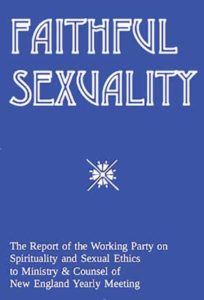Faithful Sexuality
Reviewed by Gulielma Leonard Fager
November 1, 2017
 By the Working Party on Spirituality and Sexual Ethics. New England Yearly Meeting, 2016. 68 pages. $10/pamphlet; free PDF available at neym.org.
By the Working Party on Spirituality and Sexual Ethics. New England Yearly Meeting, 2016. 68 pages. $10/pamphlet; free PDF available at neym.org.
Buy from QuakerBooks
At the end of August, a group of evangelicals published a document referred to as “The Nashville Statement,” which explicitly reaffirmed the authors’ orthodox, exclusionary sexual norms and went to the trouble of explicitly disavowing acceptance of any transgender identities. The release of such a document makes “Faithful Sexuality,” a report from New England Yearly Meeting’s Working Party on Spirituality and Sexual Ethics, all the more important in our nation’s debate around sexuality and gender.
In the twentieth century, there have been a few formal efforts to help with discernment for Friends on issues related to sexuality. The approaches have been squarely centered in the equality testimony in that recommendations tend to focus on full inclusion of Friends previously excluded in some way, such as gay and lesbian Quakers and, more recently, transgender Friends. The most widely known example of this is Towards a Quaker View of Sex, a report published by the Friends Home Service Committee of London Yearly Meeting in 1963 that focused primarily on the rising acknowledgement of homosexuality among Quakers in Britain.
In my own lifetime (b. 1980), the sexuality issue I most clearly recall being discussed among Friends is marriage of same-sex couples in meetings. While the dust has mostly settled among liberal unprogrammed Quakers, the issue is not actually dead: more conservative monthly and yearly meetings continue to grapple with homosexuality; recently, the conflict has led to several dramatic splits in yearly meetings. The Nashville Statement makes clear that in many other faith traditions, gay, lesbian, bisexual, and transgender individuals—as well as those who engage in any sexual behavior outside of heterosexual marriage—are unequal and, unless they choose a life of chastity, unwelcome.
Despite the absence of overt rules about sex and sexuality among Friends, New England Yearly Meeting’s young adult Friends community in 2005 formally asked the yearly meeting to take up the question of “What defines a positive and spiritual sexual relationship?” In 2007 NEYM formed a working party to discern answers to this question, and “Faithful Sexuality” is a report on the party’s work over a period of eight years.
Quakers in the United States represent a wide spectrum of values and beliefs about sexuality, sex, and gender. NEYM’s document reflects and will resonate most with those who are liberal. It takes as a given the equality of gender and sexual orientation; that discrimination against people for their sexual identity is not acceptable; and that a variety of forms of sexual expression can be part of normal, healthy, and spiritual relationships.
I particularly appreciated the statements from NEYM monthly meetings about their own discernment processes; these should be instructive to meetings wondering where a process of wrestling with issues related to sexuality and inclusion might take them. While many Friends meetings are havens for those who have been excluded from and wounded by religion because of their sexuality and/or gender identity, the Nashville Statement spells out the ways in which many people—heterosexual and cohabiting, LGBT and not celibate, or trans—may continue to experience exclusion, discrimination, and hurt in their faith communities.
The report demonstrates many years of discernment and work, and is an affirmation of shared liberal values on a spectrum of issues that individuals and meetings might confront related to sexuality and relationships. Given that this document was prepared by members of an unprogrammed, liberal yearly meeting who self-selected into a group to discuss sexuality, I wish that the language used throughout was fully inclusive: cis-normative terms such as “man” and “woman” appear where non-gendered terms could’ve easily been used to make the text inclusive of all who might read it.



Comments on Friendsjournal.org may be used in the Forum of the print magazine and may be edited for length and clarity.